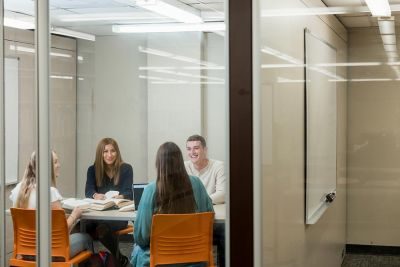Physics
Develop a thorough understanding of the principles of physics and the scientific approach to knowledge while learning from expert faculty and participating in real-world research opportunities.
Develop a thorough understanding of the principles of physics and the scientific approach to knowledge while learning from expert faculty and participating in real-world research opportunities.
What if you could talk to trees or the ocean or the Earth itself? What if you could ask a star why it shines — and it could answer you? With Physics, you can.
Physicists imagine questions and then find ways to make nature respond. Sometimes the answers to these questions are baffling. This is where new discoveries are made and a whole new world of possibilities opens. With a better understanding of how creation works, physicists can develop solutions to the problems facing society or discover all new ways to improve the quality of life.


MC’s physics program instills an in-depth knowledge of the physical laws of nature. You’ll learn to observe, analyze, and categorize interactions within our physical universe. Experienced faculty will guide you through the core principles of physics and encourage you to develop necessary critical thinking and problem solving skills.
A physics degree opens the door to a variety of fields such as renewable energy and sustainability, astronomy, aerospace engineering, biomedical engineering, geosciences, meteorology, and more.
| Requirement | Class Name | Hours |
| University Core | 36 | |
| Required Physics Courses | ||
| PHY 151 or PHY 251 |
General Physics I Fundamentals of Physics I * |
4 |
| PHY 152 or PHY 252 |
General Physics II Fundamentals of Physics II * |
4 |
| PHY 301 | Modern Physics | 3 |
| PHY 308 | Classical Mechanics | 3 |
| PHY 313 | Optics | 4 |
| PHY 401 | Quantum Mechanics | 3 |
| PHY 402 | Special Projects | 3 |
| PHY 406 | Electricity and Magnetism I | 3 |
| PHY 407 | Electricity and Magnetism II | 3 |
| PHY 433 | Physics Capstone | 1 |
| Physics and Related Electives (9 hours required) | ||
| CHE 318 | Chemical Energetics | 4 |
| ESC 205 | Computational Tools | 3 |
| ESC 311 | Statics * | 3 |
| ESC 315 | Thermodynamics *+ | 3 |
| PHY 206 | Astronomy | 3 |
| PHY 413 | Nuclear Physics + | 4 |
| PHY 417 | Selected Topics in Physics (may be taken more than once with different specific topics) | 3 |
| Mathematics Courses | ||
| MAT 121 | Calculus with Analytic Geometry I | 3 |
| MAT 122 | Calculus with Analytic Geometry II | 3 |
| MAT 221 | Calculus with Analytic Geometry III | 3 |
| MAT 222 | Calculus with Analytic Geometry IV | 3 |
| MAT 352 | Introduction to Differential Equations | 3 |
| And two of the following courses: | ||
| MAT 213 | Applied Linear Algebra | 3 |
| MAT 353 | Introduction to Mathematical Probability and Statistics | 3 |
| MAT 381 | Introduction to Numerical Methods | 3 |
| Chemistry Courses | ||
| CHE 141 | General Chemistry I | 4 |
| CHE 142 | General Chemistry II | 4 |
| CHE 317 | Chemical Dynamics | 4 |
| Computer Science | ||
| Choose one of the following courses: | ||
| CSC 105 or | C Programming for Scientists and Engineers | 3 |
| CSC 204 | Practical Fortran Programming | 3 |
| Communication Course | ||
| COM 203 | Professional Communication Skills | 3 |
| General Electives | Sufficient elective hours must be taken to meet the minimum hour requirement for graduation in this program. Electives should be chosen in consultation with advisor. | -- |
| Total Hours | 130 | |
* Students interested in pursuing additional studies in engineering should elect these courses as a minimum.
+ Students interested in pursuing additional studies in physics should elect these courses as a minimum.
The problem solving, critical thinking, and data analysis skills incumbent in a physics degree means that graduates have a variety of career paths to choose from.
Most graduates with a bachelor’s degree in physics working in the private sector find a job in an engineering field, such as aerospace, process or research engineer.
A Physics degree opens the door to careers in research labs, either through further education in graduate programs or as lab technicians and assistants.
The second largest sector of employment for physics majors is in Computer or Information Systems where graduates work in a variety of positions such as consultants, developers, and analysts.
200 S. Capitol Street, Clinton, MS 39056
601.925.3000